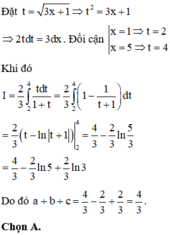Giả sử tích phân . Lúc đó:
Hãy nhập câu hỏi của bạn vào đây, nếu là tài khoản VIP, bạn sẽ được ưu tiên trả lời.



a) Bất phương trình đã cho tương đương với hệ sau:


Vậy tập nghiệm là (−1;0) ∪ (7/2; + ∞ )
b) Tương tự câu a), tập nghiệm là (1/10; 5)
c) Đặt t = log 2 x , ta có bất phương trình 2 t 3 + 5 t 2 + t – 2 ≥ 0 hay (t + 2)(2 t 2 + t − 1) ≥ 0 có nghiệm −2 ≤ t ≤ −1 hoặc t ≥ 1/2
Suy ra 1/4 ≤ x ≤ 1/2 hoặc x ≥ 2
Vậy tập nghiệm của bất phương trình đã cho là: [1/4; 1/2] ∪ [ 2 ; + ∞ )
d) Bất phương trình đã cho tương đương với hệ:


Vậy tập nghiệm là (ln(2/3); 0] ∪ [ln2; + ∞ )

a) \(\int\dfrac{2dx}{x^2-5x}=\int\left(\dfrac{-2}{5x}+\dfrac{2}{5\left(x-5\right)}\right)dx=-\dfrac{2}{5}ln\left|x\right|+\dfrac{2}{5}ln\left|x-5\right|+C\)
\(\Rightarrow A=-\dfrac{2}{5};B=\dfrac{2}{5}\Rightarrow2A-3B=-2\)
b) \(\int\dfrac{x^3-1}{x+1}dx=\int\dfrac{x^3+1-2}{x+1}dx=\int\left(x^2-x+1-\dfrac{2}{x+1}\right)dx=\dfrac{1}{3}x^3-\dfrac{1}{2}x^2+x-2ln\left|x+1\right|+C\)
\(\Rightarrow A=\dfrac{1}{3};B=\dfrac{1}{2};E=-2\Rightarrow A-B+E=-\dfrac{13}{6}\)

\(a,5^x< 0,125\\ \Leftrightarrow x< -1,292\\ b,\left(\dfrac{1}{3}\right)^{2x+1}\ge3\\ \Leftrightarrow2x+1\le-1\\ \Leftrightarrow2x\le-2\\ \Leftrightarrow x\le-1\)
c, Điều kiện: x > 0
\(log_{0,3}x>0\\ \Leftrightarrow x>1\)
d, Điều kiện: \(x>\dfrac{3}{2}\)
\(ln\left(x+4\right)>ln\left(2x-3\right)\\ \Rightarrow x+4>2x-3\\ \Leftrightarrow x< 7\)
Vậy \(\dfrac{3}{2}< x< 7\)

a) Điều kiện: \(\left\{{}\begin{matrix}4x+2>0\\x-1>0\\x>0\end{matrix}\right.\)
Hay là: \(x>1\)
Khi đó biến đổi pương trình như sau:
\(\ln\dfrac{4x+2}{x-1}=\ln x\)
\(\Leftrightarrow\dfrac{4x+2}{x-1}=x\)
\(\Leftrightarrow4x+2=x\left(x-1\right)\)
\(\Leftrightarrow x^2-5x-2=0\)
\(\Leftrightarrow\left[{}\begin{matrix}x_1=\dfrac{5+\sqrt{33}}{2}\\x_2=\dfrac{5-\sqrt{33}}{2}\left(loại\right)\end{matrix}\right.\)
Vậy nghiệm của phương trình là: \(x=\dfrac{5+\sqrt{33}}{2}\)
b) Điều kiện: \(\left\{{}\begin{matrix}3x+1>0\\x>0\end{matrix}\right.\)
Hay là: \(x>0\)
Biến đổi phương trình như sau:
\(\log_2\left(3x+1\right)\log_3x-2\log_2\left(3x+1\right)=0\)
\(\Leftrightarrow\log_2\left(3x+1\right)\left(\log_3x-2\right)=0\)
\(\Leftrightarrow\left[{}\begin{matrix}\log_2\left(3x+1\right)=0\\\log_3x=2\end{matrix}\right.\)
\(\Leftrightarrow\left[{}\begin{matrix}3x+1=2^0\\x=3^2\end{matrix}\right.\)
\(\Leftrightarrow\left[{}\begin{matrix}x=0\left(loại\right)\\x=9\end{matrix}\right.\)
Vậy nghiệm là x = 9.

\(a,y'=8x^3-9x^2+10x\\ \Rightarrow y''=24x^2-18x+10\\ b,y'=\dfrac{2}{\left(3-x\right)^2}\\ \Rightarrow y''=\dfrac{4}{\left(3-x\right)^3}\)
\(c,y'=2cos2xcosx-sin2xsinx\\ \Rightarrow y''=-5sin\left(2x\right)cos\left(x\right)-4cos\left(2x\right)sin\left(x\right)\\ d,y'=-2e^{-2x+3}\\ \Rightarrow y''=4e^{-2x+3}\)

`a)TXĐ:R\\{1;1/3}`
`y'=[-4(6x-4)]/[(3x^2-4x+1)^5]`
`b)TXĐ:R`
`y'=2x. 3^[x^2-1] ln 3-e^[-x+1]`
`c)TXĐ: (4;+oo)`
`y'=[2x-4]/[x^2-4x]+2/[(2x-1).ln 3]`
`d)TXĐ:(0;+oo)`
`y'=ln x+2/[(x+1)^2].2^[[x-1]/[x+1]].ln 2`
`e)TXĐ:(-oo;-1)uu(1;+oo)`
`y'=-7x^[-8]-[2x]/[x^2-1]`
Lời giải:
a.
$y'=-4(3x^2-4x+1)^{-5}(3x^2-4x+1)'$
$=-4(3x^2-4x+1)^{-5}(6x-4)$
$=-8(3x-2)(3x^2-4x+1)^{-5}$
b.
$y'=(3^{x^2-1})'+(e^{-x+1})'$
$=(x^2-1)'3^{x^2-1}\ln 3 + (-x+1)'e^{-x+1}$
$=2x.3^{x^2-1}.\ln 3 -e^{-x+1}$
c.
$y'=\frac{(x^2-4x)'}{x^2-4x}+\frac{(2x-1)'}{(2x-1)\ln 3}$
$=\frac{2x-4}{x^2-4x}+\frac{2}{(2x-1)\ln 3}$
d.
\(y'=(x\ln x)'+(2^{\frac{x-1}{x+1}})'=x(\ln x)'+x'\ln x+(\frac{x-1}{x+1})'.2^{\frac{x-1}{x+1}}\ln 2\)
\(=x.\frac{1}{x}+\ln x+\frac{2}{(x+1)^2}.2^{\frac{x-1}{x+1}}\ln 2\\ =1+\ln x+\frac{2^{\frac{2x}{x+1}}\ln 2}{(x+1)^2}\)
e.
\(y'=-7x^{-8}-\frac{(x^2-1)'}{x^2-1}=-7x^{-8}-\frac{2x}{x^2-1}\)

\(a,A=ln\left(\dfrac{x}{x-1}\right)+ln\left(\dfrac{x+1}{x}\right)-ln\left(x^2-1\right)\\ =ln\left(\dfrac{x}{x-1}\cdot\dfrac{x+1}{x}\right)-ln\left(x^2-1\right)\\ =ln\left(\dfrac{x+1}{x-1}\right)-ln\left(x^2-1\right)\\ =ln\left(\dfrac{x+1}{x-1}\cdot\dfrac{1}{x^2-1}\right)\\ =ln\left[\dfrac{1}{\left(x-1\right)^2}\right]\\ =2ln\left(\dfrac{1}{x-1}\right)\)
\(b,21log_3\sqrt[3]{x}+log_3\left(9x^2\right)-log_3\left(9\right)\\ =7log_3\left(x\right)+log_3x^2+log_39-log_39\\ =7log_3x+2log_3x\\ =9log_3x\)

a)
\(\begin{array}{c}A = {\log _{\frac{1}{3}}}5 + 2{\log _9}25 - {\log _{\sqrt 3 }}\frac{1}{5} = {\log _{{3^{ - 1}}}}5 + 2{\log _{{3^2}}}{5^2} - {\log _{{3^{\frac{1}{2}}}}}{5^{ - 1}}\\ = - {\log _3}5 + 2{\log _3}5 + 2{\log _3}5 = 3{\log _3}5\end{array}\)
b) \(B = {\log _a}{M^2} + {\log _{{a^2}}}{M^4} = 2{\log _a}M + \frac{1}{2}.4{\log _a}M = 4{\log _a}M\)

a, Điều kiện: \(2^x\ne3\Rightarrow x\ne log_23\)
Vậy D = R \ \(log_23\)
b, Điều kiện: \(25-5^x\ge0\Rightarrow5^x\le5^2\Rightarrow x\le2\)
Vậy D = \((-\infty;2]\)
c, Điều kiện: \(\left\{{}\begin{matrix}x>0\\lnx\ne1\end{matrix}\right.\Rightarrow\left\{{}\begin{matrix}x>0\\x\ne e\end{matrix}\right.\)
Vậy D = \(\left(0;+\infty\right)\backslash\left\{e\right\}\)
d, Điều kiện: \(\left\{{}\begin{matrix}x>0\\1-log_3x\ge0\end{matrix}\right.\Rightarrow\left\{{}\begin{matrix}x>0\\log_3x\le1\end{matrix}\right.\Rightarrow\left\{{}\begin{matrix}x>0\\x\le3\end{matrix}\right.\Rightarrow0< x\le3\)
Vậy D = \((0;3]\)